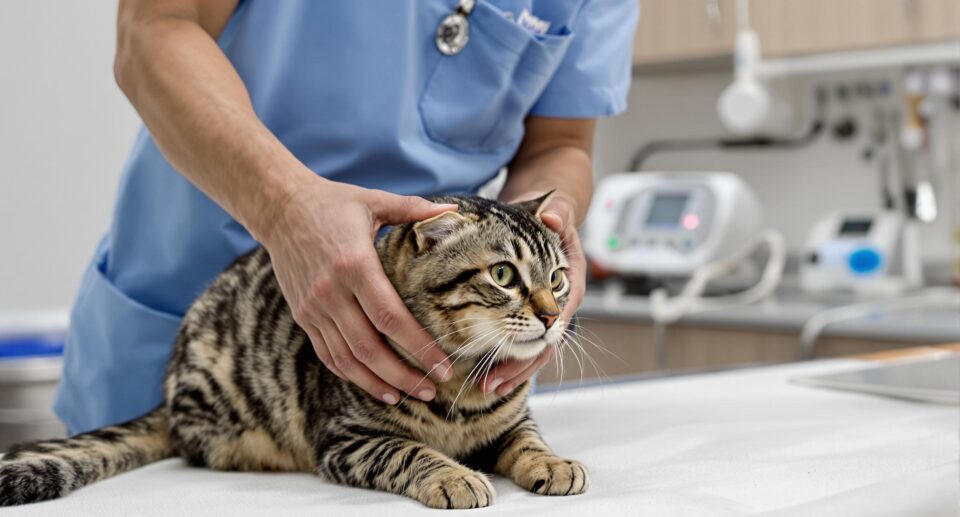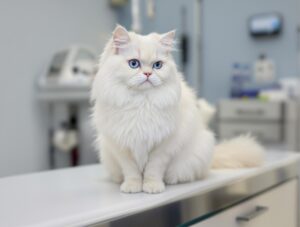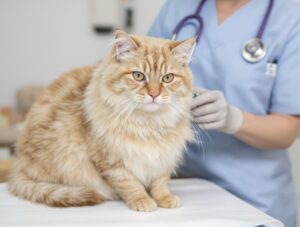Cat Vaccination Schedule: Essential Shots and When to Get Them

Key Takeaways:
- Core vaccines like FVRCP and rabies are essential for all cats, including those that live exclusively indoors.
- Kittens require a series of timed boosters to build immunity, while adult cats need regular updates to maintain protection.
- Vaccine schedules can vary based on your cat’s age, health status, and lifestyle. Consult your vet to create the right plan.
Why Vaccines Are Important for Cats
Vaccines play a key role in protecting cats from life-threatening diseases, many of which can spread quickly and quietly. Getting the timing right helps ensure your cat is fully covered, whether they’re snuggled up indoors or exploring outside. With a consistent schedule, your cat’s immune system stays ready to fight off serious infections.
At PetHealthMD, we’re here to help you understand what your cat needs and when. This essential guide breaks down every stage of the vaccination timeline so you can feel confident about each visit to the vet.

Core Vaccines All Cats Need
Core vaccines are considered essential for all cats, no matter their lifestyle. These vaccines help protect against highly contagious and potentially life-threatening viruses that are widespread and, in many cases, difficult to treat. Even indoor cats can be exposed through contact with humans, shared spaces, or unexpected outdoor escapes.
The core vaccines for cats include:
- Feline Panleukopenia Virus (FPV): Also known as feline parvovirus, this virus causes severe gastrointestinal illness and can be fatal, especially in kittens.
- Feline Herpesvirus (FHV-1) and Feline Calicivirus (FCV): These viruses are the main culprits behind upper respiratory infections in cats and are often included with panleukopenia in a combination vaccine commonly labeled as FVRCP.
- Rabies: A fatal virus that affects the nervous system and can be transmitted to humans. Rabies vaccination is required by law in many areas and is considered essential for all cats.
This combination of vaccines—often referred to as the “core set”—provides strong protection against serious illnesses. Starting these vaccines at the right age and following up with boosters helps your cat build long-term immunity.
According to Kirk’s Current Veterinary Therapy, immunity to core viral vaccines can last for many years—sometimes for a cat’s lifetime. Avoiding unnecessary over-vaccination helps protect your cat’s long-term health.
For more preventive care options, explore cat health and wellness essentials at 1800PetMeds.
Cat Vaccination Schedule by Life Stage
Cats need different vaccination support depending on their age and health. Rather than memorizing a complex timeline, it’s helpful to follow general guidelines and then work with your vet to fine-tune the plan based on lifestyle and risk level.
| Cat Age | Panleukopenia / FVRCP | Leukemia Virus | Rabies |
| Kitten | Every 3–4 weeks starting at 8 weeks through 12–16 weeks old | If outdoor kitten, at 12 and 14–16 weeks | 4–6 months, depending on regulations |
| Adult Cat (1–5 years) | Booster at 1 year, then every 3 years (or based on antibody titers) | Not usually needed or recommended | Every 3 years |
| Adult Cat (5–10 years) | Usually not needed unless titers are low | Not usually needed or recommended | Every 3 years |
| Geriatric or Chronically Ill | Usually not needed or recommended | Not recommended | Every 3 years unless exempt for medical reasons |
These guidelines ensure your cat stays protected without unnecessary interventions. Older or chronically ill cats may benefit from reduced vaccination schedules or antibody titer testing to assess immunity.
To support your cat’s recovery after vaccinations, browse cat vitamins and supplements that promote immune health.

Non-Core Vaccines
Other vaccines, such as those for feline immunodeficiency virus (FIV), Chlamydia felis, or feline infectious peritonitis (FIP), are generally not recommended. These vaccines have limited effectiveness or potential side effects, so they’re typically reserved for cats with specific risks as identified by a veterinarian.
If your cat’s habits or environment shift—for instance, if they start going outdoors—check in with your vet to update their vaccine plan. Tailoring the approach to your cat’s lifestyle keeps them safest.
Caring for Your Cat After a Vaccination
After your cat’s appointment, a little extra care can help them recover comfortably. It’s normal for cats to be sleepy, less playful, or mildly sore for a day or two after vaccines. Keeping them calm and cozy makes a big difference.
Post-vaccine care tips:
- Create a cozy recovery spot: Set up a quiet space with a soft bed or blanket where your cat can rest undisturbed.
- Use calming aids: A gentle calming spray or diffuser can help ease post-vaccine stress.
- Keep things low-key: Limit noise and activity for 24–48 hours.
- Encourage eating and drinking: Offer favorite treats or wet food if appetite decreases.
- Monitor for side effects: Mild sleepiness or swelling is normal, but contact your vet if your cat shows vomiting, persistent swelling, or discomfort.
For more support, shop cat calming products to make recovery easier.
Stick to the Timeline for Long-Term Protection
Vaccines are one of the simplest, most effective ways to prevent avoidable diseases in cats. Staying consistent with their vaccination schedule protects your pet for life. Work closely with your veterinarian to design a plan that fits your cat’s specific needs and lifestyle.
At PetHealthMD, we focus on everyday health choices that make a lasting difference for your pet. For continued wellness and preventive care essentials, visit Cat Wellness and Preventive Care on 1800PetMeds.

FAQs About Cat Vaccinations
How often do indoor cats need vaccinations?
Even indoor cats need core vaccines like FVRCP and rabies, typically updated every three years after the initial booster. Indoor cats can still be exposed to viruses carried on clothing or through open windows.
Do older cats still need vaccines?
Senior cats may not need frequent boosters if antibody titers show lasting immunity. However, rabies vaccines are still required by law in most areas.
Can vaccines make my cat sick?
Most cats experience only mild, temporary side effects such as fatigue or tenderness. Serious reactions are rare, but always contact your vet if your cat seems unusually lethargic or shows swelling at the injection site.
What should I do if I missed a vaccine appointment?
If your cat misses a scheduled booster, contact your veterinarian. They can assess whether your cat needs to restart the series or simply receive a single dose to stay protected.
Are non-core vaccines worth it for outdoor cats?
Outdoor cats may benefit from additional vaccines like feline leukemia virus (FeLV) depending on their exposure risk. Discuss your cat’s habits and environment with your vet to determine what’s necessary.





